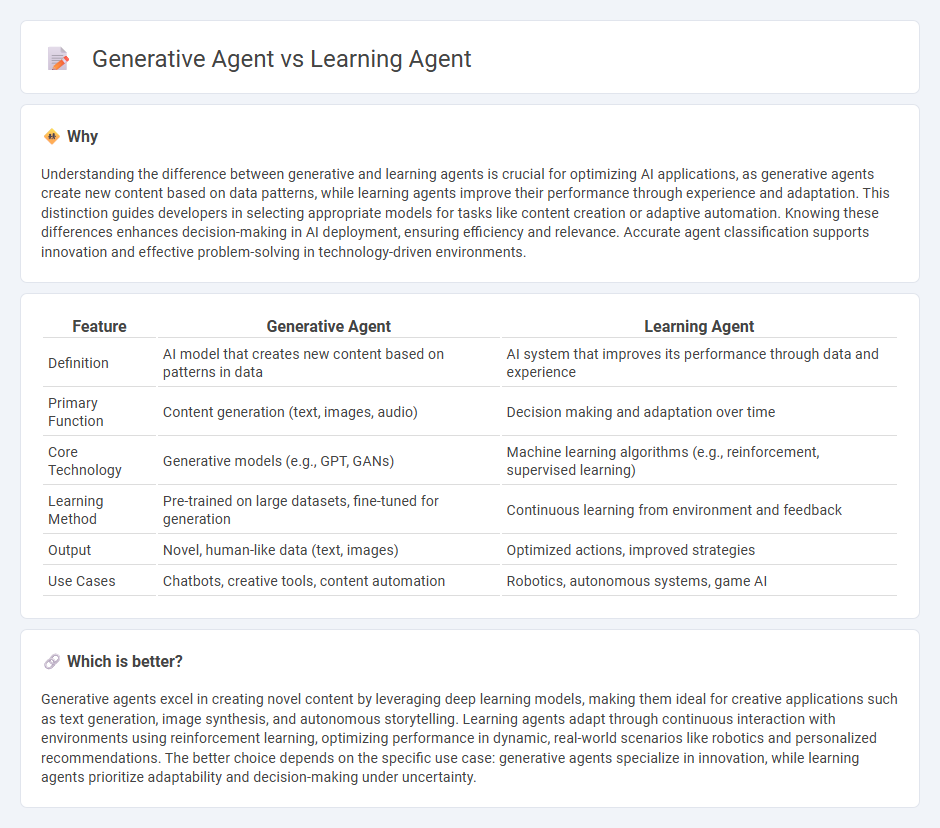
Generative agents create new content, ideas, or solutions by simulating human creativity using advanced algorithms such as GPT or GANs. Learning agents, on the other hand, improve their performance over time by adapting through experience and data, primarily utilizing reinforcement learning or supervised learning techniques. Discover how these distinct AI paradigms transform industries and innovation by exploring their unique capabilities.
Why it is important
Understanding the difference between generative and learning agents is crucial for optimizing AI applications, as generative agents create new content based on data patterns, while learning agents improve their performance through experience and adaptation. This distinction guides developers in selecting appropriate models for tasks like content creation or adaptive automation. Knowing these differences enhances decision-making in AI deployment, ensuring efficiency and relevance. Accurate agent classification supports innovation and effective problem-solving in technology-driven environments.
Comparison Table
| Feature | Generative Agent | Learning Agent |
|---|---|---|
| Definition | AI model that creates new content based on patterns in data | AI system that improves its performance through data and experience |
| Primary Function | Content generation (text, images, audio) | Decision making and adaptation over time |
| Core Technology | Generative models (e.g., GPT, GANs) | Machine learning algorithms (e.g., reinforcement, supervised learning) |
| Learning Method | Pre-trained on large datasets, fine-tuned for generation | Continuous learning from environment and feedback |
| Output | Novel, human-like data (text, images) | Optimized actions, improved strategies |
| Use Cases | Chatbots, creative tools, content automation | Robotics, autonomous systems, game AI |
Which is better?
Generative agents excel in creating novel content by leveraging deep learning models, making them ideal for creative applications such as text generation, image synthesis, and autonomous storytelling. Learning agents adapt through continuous interaction with environments using reinforcement learning, optimizing performance in dynamic, real-world scenarios like robotics and personalized recommendations. The better choice depends on the specific use case: generative agents specialize in innovation, while learning agents prioritize adaptability and decision-making under uncertainty.
Connection
Generative agents create new content or solutions by leveraging learned patterns, while learning agents continuously improve their performance through experience and data input. The connection lies in learning agents providing the adaptive capabilities that enable generative agents to refine their outputs over time. This symbiosis enhances artificial intelligence systems by combining creative generation with ongoing learning processes.
Key Terms
Adaptation
Learning agents continuously improve their decision-making by updating their knowledge based on environmental feedback, enabling real-time adaptation to dynamic conditions. Generative agents simulate human-like behaviors by creating and refining internal narratives, allowing for anticipatory adaptation through scenario generation. Explore deeper insights on how these agents transform adaptive processes in artificial intelligence.
Content Creation
Learning agents adapt their behavior based on data inputs to improve decision-making, often utilizing reinforcement learning and machine learning algorithms to optimize performance over time. Generative agents specialize in content creation by synthesizing new, realistic outputs such as text, images, or audio through models like GANs (Generative Adversarial Networks) and large language models (LLMs). Explore further to understand how these AI paradigms revolutionize content generation and personalization in digital media.
Feedback Loop
Learning agents utilize continuous feedback loops to adapt and improve their performance by analyzing environmental responses and adjusting actions accordingly. Generative agents integrate feedback loops to refine their output, often synthesizing new data or content based on prior interactions and learned patterns. Explore further to understand how feedback mechanisms uniquely enhance both agent types.
Source and External Links
What Are Learning Agents? | TEDAI San Francisco - A learning agent is an AI system that starts with basic knowledge and improves performance by interacting with its environment, consisting of four main components: learning element, critic, performance element, and problem generator.
What is AI Agent Learning? | IBM - AI agent learning is the process where an AI agent enhances its decision-making and efficiency over time by adapting to new experiences and feedback in dynamic environments.
Learning Agents in AI | GeeksforGeeks - Learning agents in AI autonomously interact with their environment, acquire knowledge, and adapt behavior dynamically to improve performance, supported by components like sensors, critic, and learning element.
 dowidth.com
dowidth.com